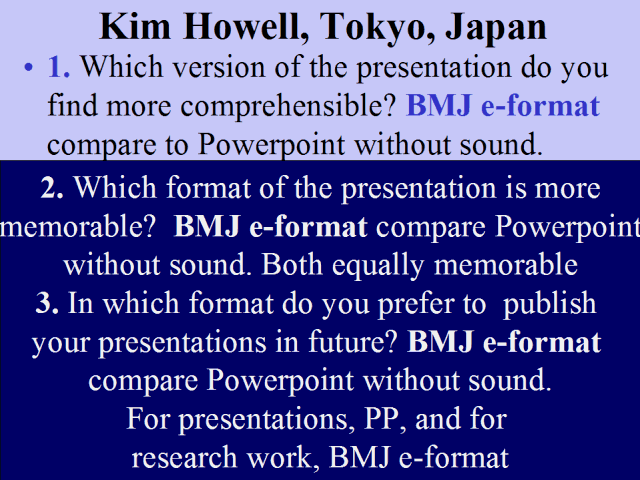| front |1 |2 |3 |4 |5 |6 |7 |8 |9 |10 |11 |12 |13 |14 |15 |16 |17 |18 |19 |20 |21 |22 |23 |24 |25 |26 |27 |28 |29 |30 |31 |32 |33 |34 |35 |36 |37 |38 |39 |40 |41 |42 |43 |44 |45 |review |
 |
Finally, I read
the print version of your article last night, in the comfort of my futon, at
home. I only have access to the Internet at work and reading articles
not related to my duties is something for the lunch hour only. After a day
spent in front of a screen, paper is more pleasant… Kim Howell, not a Supercourse faculty, Editor, Excerpta Medica, Japan Extra comments: 1. "I was enjoying reading the uploaded comments until, at around posting 19, no more text appeared on my computer screen - I have no idea why. Furthermore, when I tried to use the review form, the 'submit' button didn't work. These are certainly major disadvantages with this system. Any comments?" 2. «In your letter to the BMJ, you say that this survey was designed to compare the '3 century old journal publication model with PowerPoint scientific communication model' and your analysis of the first 13 forms concludes that PowerPoint is 'a better means of Research Communication that [sic] journals'. The survey questions compared only BMJ _e-format_ and PowerPoint (with or without sound); comparison with the paper journal was not invited. The conclusion should specify this, i.e. 'PowerPoint is a better means of research communication than journal e-format'. The current wording suggests that PowerPoint is better than both electronic _and_ paper journals. Regarding the letter to the BMJ, you say that 'We would very much appreciate if more scientists (not editors!!!) would comment upon which format is best.’ I have worked in research, academic, and publishing environments. Does my PhD allow me to respond as a scientist? Or does my editorial work disqualify me from commenting? Many scientific copy-editors are ex-scientists. Many academic editors are scientists. Are comments from general, non-scientist readers welcomed? |